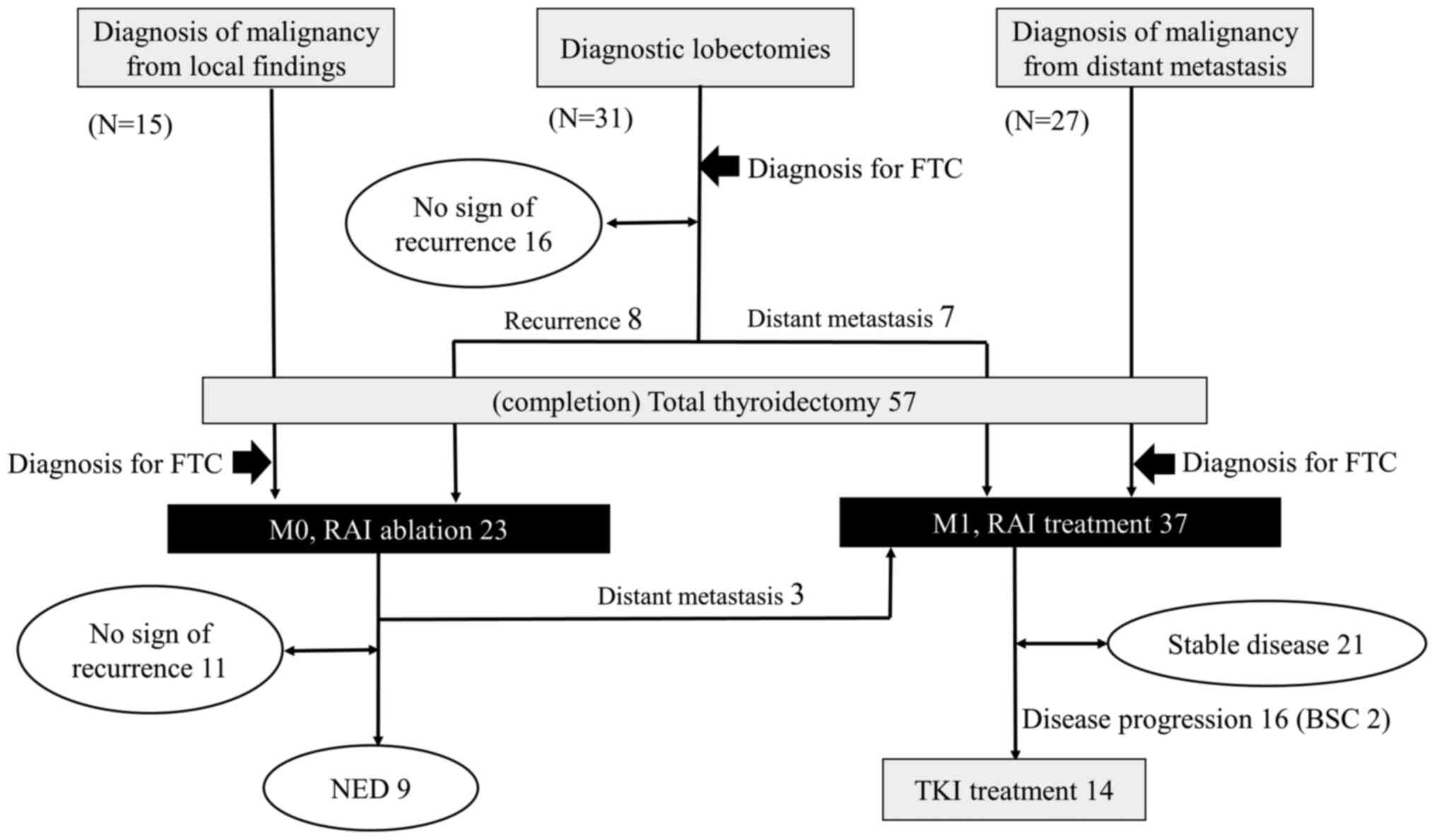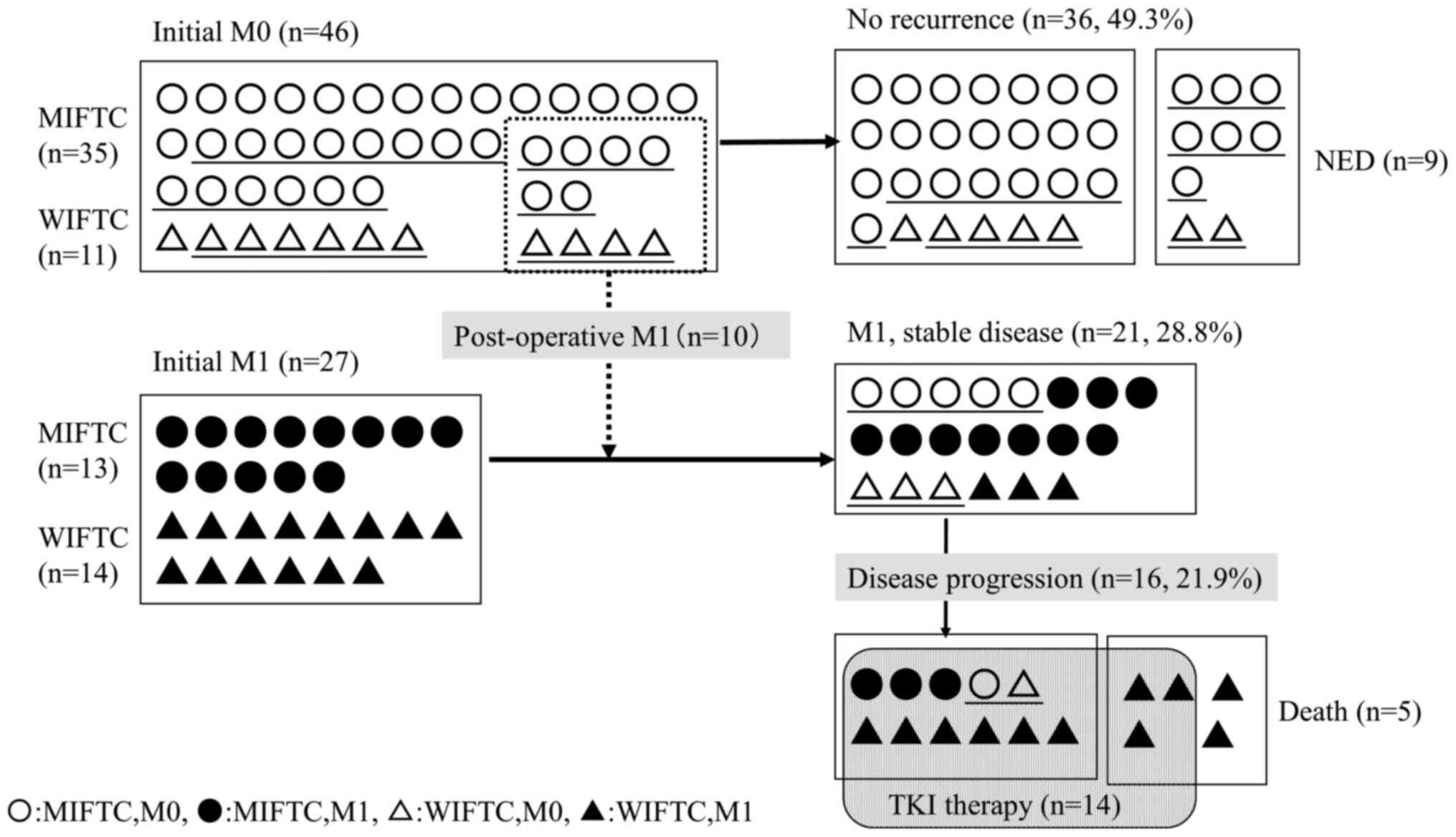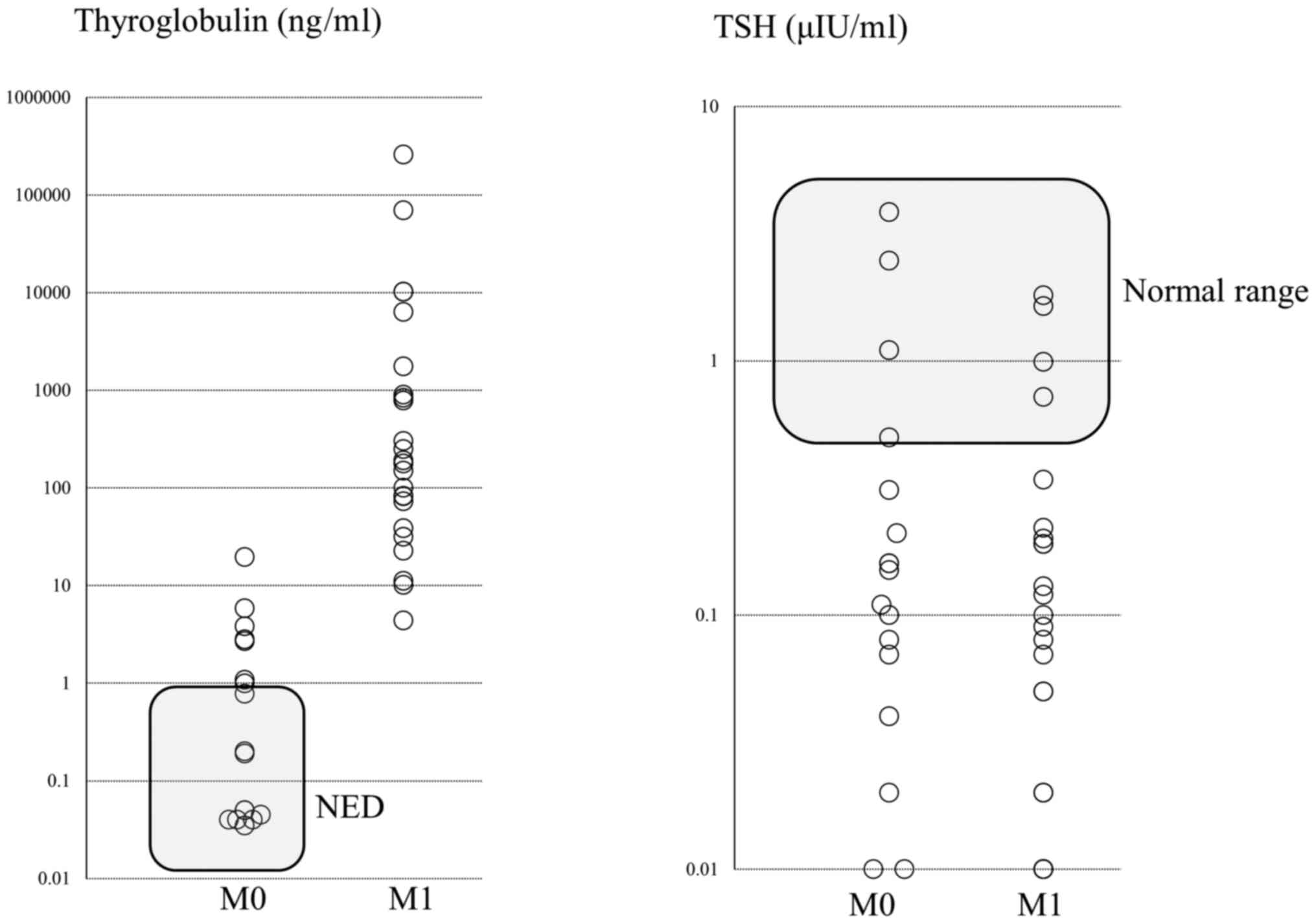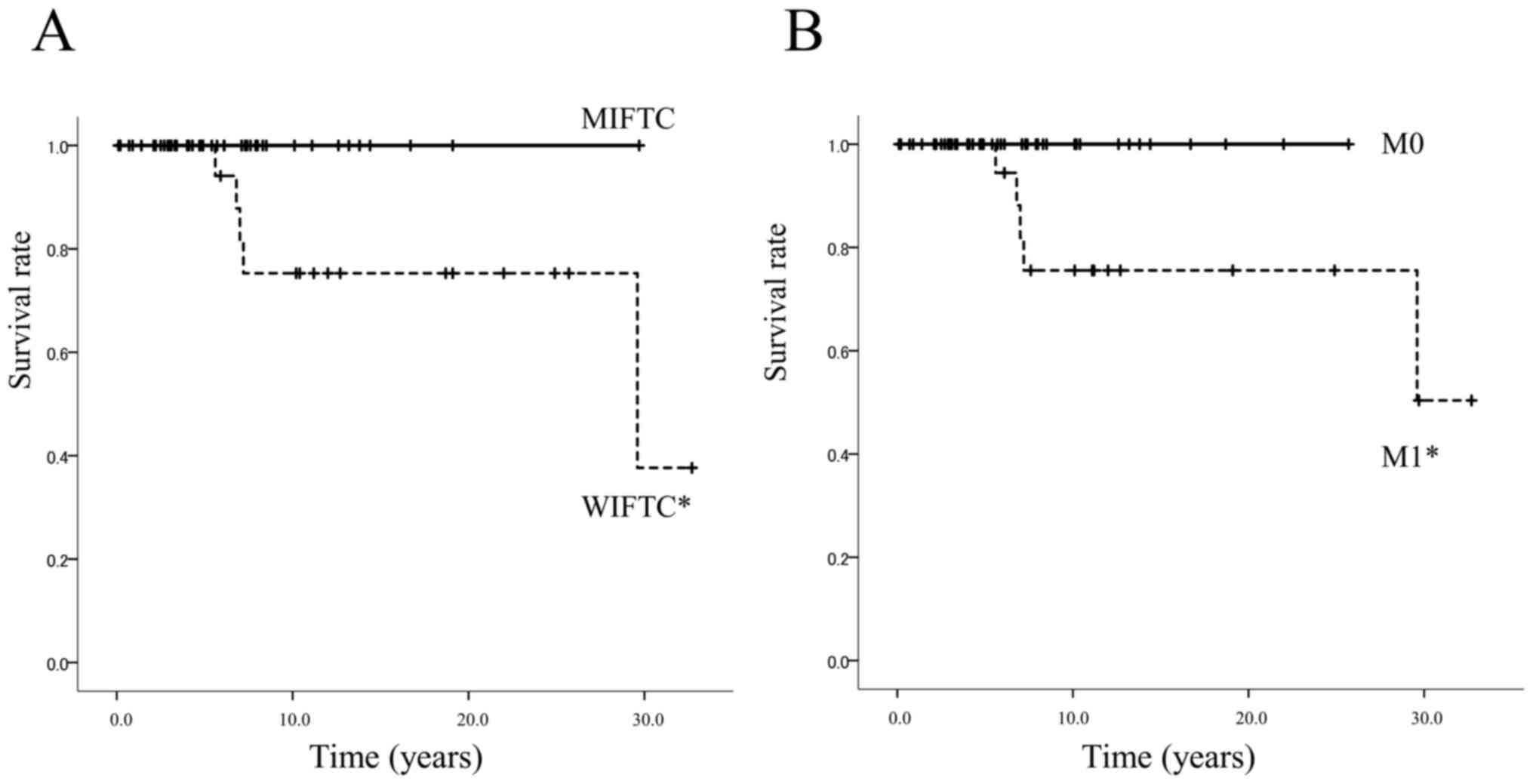|
1
|
Deandrea M, Motta M, Divito L, Mormile A,
Gallone G, Grassi A, Pellerito R, Nasi P, Torchio B, Garberoglio R
and Fonzo D: Thyroid cytology and risk of thyroid cancer:
Differences among indeterminate specimens. Endocr Pract.
10:330–334. 2004.PubMed/NCBI View Article : Google Scholar
|
|
2
|
Renshaw AA and Gould EW: Impact of
specific patterns on the sensitivity for follicular and Hurthle
cell carcinoma in thyroid fine-needle aspiration. Cancer
Cytopathol. 124:729–736. 2016.PubMed/NCBI View Article : Google Scholar
|
|
3
|
Kanda Y: Investigation of the freely
available easy-to-use software ‘EZR’ for medical statistics. Bone
Marrow Transplant. 48:452–458. 2013.PubMed/NCBI View Article : Google Scholar
|
|
4
|
Haugen BR, Alexander EK, Bible KC, Doherty
GM, Mandel SJ, Nikiforov YE, Pacini F, Randolph GW, Sawka AM,
Schlumberger M, et al: 2015 American thyroid association management
guidelines for adult patients with thyroid nodules and
differentiated thyroid cancer: The American thyroid association
guidelines task force on thyroid nodules and differentiated thyroid
cancer. Thyroid. 26:1–133. 2016.PubMed/NCBI View Article : Google Scholar
|
|
5
|
Kim M, Han M, Lee JH, Song DE, Kim K, Baek
JH, Shong YK and Kim WG: Tumour growth rate of follicular thyroid
carcinoma is not different from that of follicular adenoma. Clin
Endocrinol (Oxf). 88:936–942. 2018.PubMed/NCBI View Article : Google Scholar
|
|
6
|
Nikiforov YE, Ohori NP, Hodak SP, Carty
SE, LeBeau SO, Ferris RL, Yip L, Seethala RR, Tublin ME, Stang MT,
et al: Impact of mutational testing on the diagnosis and management
of patients with cytologically indeterminate thyroid nodules: A
prospective analysis of 1056 FNA samples. J Clin Endocrinol Metab.
96:3390–3397. 2011.PubMed/NCBI View Article : Google Scholar
|
|
7
|
Correction to Diagnostic performance of
ultrasound-based risk-stratification systems for thyroid nodules:
Comparison of the 2015 American thyroid association guidelines with
the 2016 Korean thyroid association/korean society of thyroid
radiology and 2017 American college of radiology guidelines Ha EJ,
Na DG, Moon W-J, Lee YH, and Choi N Thyroid 2018; 28: 1532-1537.
DOI: 10.1089/thy.2018.0094. Thyroid 29: 159, 2019.
|
|
8
|
Goffredo P, Cheung K, Roman SA and Sosa
JA: Can minimally invasive follicular thyroid cancer be approached
as a benign lesion?: A population-level analysis of survival among
1,200 patients. Ann Surg Oncol. 20:767–772. 2013.PubMed/NCBI View Article : Google Scholar
|
|
9
|
Lin JD, Chao TC, Chen ST, Huang YY, Liou
MJ and Hsueh C: Operative strategy for follicular thyroid cancer in
risk groups stratified by pTNM staging. Surg Oncol. 16:107–113.
2007.PubMed/NCBI View Article : Google Scholar
|
|
10
|
Grani G, Lamartina L, Durante C, Filetti S
and Cooper DS: Follicular thyroid cancer and Hurthle cell
carcinoma: Challenges in diagnosis, treatment, and clinical
management. Lancet Diabetes Endocrinol. 6:500–514. 2018.PubMed/NCBI View Article : Google Scholar
|
|
11
|
Stenson G, Nilsson IL, Mu N, Larsson C,
Lundgren CI, Juhlin CC, Höög A and Zedenius J: Minimally invasive
follicular thyroid carcinomas: Prognostic factors. Endocrine.
53:505–511. 2016.PubMed/NCBI View Article : Google Scholar
|
|
12
|
Lee YM, Song DE, Kim TY, Sung TY, Yoon JH,
Chung KW and Hong SJ: Risk factors for distant metastasis in
patients with minimally invasive follicular thyroid carcinoma. PLoS
One. 11(e0155489)2016.PubMed/NCBI View Article : Google Scholar
|
|
13
|
Iwasaki H, Matsumoto A, Ito K, Kure Y,
Suzuki A, Sugino K, Ozaki O and Noh J: Prediction of distant
metastasis in follicular adenocarcinoma of the thyroid. World J
Surg. 14:425–430. 1990.PubMed/NCBI View Article : Google Scholar
|
|
14
|
Gulcelik MA, Gulcelik NE, Kuru B, Camlibel
M and Alagol H: Prognostic factors determining survival in
differentiated thyroid cancer. J Surg Oncol. 96:598–604.
2007.PubMed/NCBI View Article : Google Scholar
|
|
15
|
Passler C, Scheuba C, Prager G, Kaczirek
K, Kaserer K, Zettinig G and Niederle B: Prognostic factors of
papillary and follicular thyroid cancer: Differences in an
iodine-replete endemic goiter region. Endocr Relat Cancer.
11:131–139. 2004.PubMed/NCBI View Article : Google Scholar
|
|
16
|
Verburg FA, Mäder U, Luster M and Reiners
C: Primary tumour diameter as a risk factor for advanced disease
features of differentiated thyroid carcinoma. Clin Endocrinol
(Oxf). 71:291–297. 2009.PubMed/NCBI View Article : Google Scholar
|
|
17
|
Melo M, da Rocha AG, Vinagre J, Batista R,
Peixoto J, Tavares C, Celestino R, Almeida A, Salgado C, Eloy C, et
al: TERT promoter mutations are a major indicator of poor outcome
in differentiated thyroid carcinomas. J Clin Endocrinol Metab.
99:E754–E765. 2014.PubMed/NCBI View Article : Google Scholar
|
|
18
|
Jang EK, Song DE, Sim SY, Kwon H, Choi YM,
Jeon MJ, Han JM, Kim WG, Kim TY, Shong YK and Kim WB: NRAS codon 61
mutation is associated with distant metastasis in patients with
follicular thyroid carcinoma. Thyroid. 24:1275–1281.
2014.PubMed/NCBI View Article : Google Scholar
|
|
19
|
de Melo TG, Zantut-Wittmann DE, Ficher E
and da Assumpcao LV: Factors related to mortality in patients with
papillary and follicular thyroid cancer in long-term follow-up. J
Endocrinol Invest. 37:1195–1200. 2014.PubMed/NCBI View Article : Google Scholar
|
|
20
|
Lee YM, Lee YH, Song DE, Kim WB, Sung TY,
Yoon JH, Chung KW and Hong SJ: Prognostic impact of further
treatments on distant metastasis in patients with minimally
invasive follicular thyroid carcinoma: Verification using inverse
probability of treatment weighting. World J Surg.
41(1144)2017.PubMed/NCBI View Article : Google Scholar
|
|
21
|
Biondi B and Cooper DS: Benefits of
thyrotropin suppression versus the risks of adverse effects in
differentiated thyroid cancer. Thyroid. 20:135–146. 2010.PubMed/NCBI View Article : Google Scholar
|
|
22
|
Vera L, Gay S, Campomenosi C, Paolino S,
Pera G, Monti E, Mortara L, Seriolo B and Giusti M: Ten-year
estimated risk of bone fracture in women with differentiated
thyroid cancer under TSH-suppressive levothyroxine therapy.
Endokrynol Pol. 67:350–358. 2016.PubMed/NCBI View Article : Google Scholar
|
|
23
|
Iwasaki H, Yamazaki H, Takasaki H,
Suganuma N, Sakai R, Nakayama H, Hatori S, Toda S and Masudo K:
Treatment outcomes of differentiated thyroid cancer with distant
metastasis improve by tyrosine kinase inhibitors. Oncol Lett.
17:5292–5300. 2019.PubMed/NCBI View Article : Google Scholar
|


















